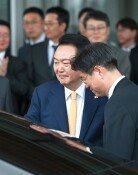Joint newspaper between South Korea and Japan
Joint newspaper between South Korea and Japan
Posted January. 15, 2015 07:34,
I was surprised when I received an e-mail message on the New Years Day from a close South Korean journalist friend. He said that in his first dream of the New Year, I was appointed as editor of the Dong-A Ilbos Political Desk to reform the newspapers content. In the dream, I also had a news conference upon taking office.
The Dong-A Ilbo has allowed me to write this column for a long time. But why did he dream such a weird dream? While wondering why, I remembered an episode from 16 years ago.
It happened on April 1, 1999, when I was serving as editor of the Asahi Shimbuns Political Desk. The paper ran an article that then Japanese Prime Minister Keizo Obuchi had decided to appoint a foreigner as a minister of his cabinet. Reporting that the prime minister made the decision with a goal of reforming Japan, the daily cited former Soviet Union President Mikhail Gorbachev and ex-British Prime Minister Margaret Thatcher, among others.
Of course, the article was an April fools Day joke but the impact was too big because it was accompanied by a very serious-looking analysis. Many readers took the article seriously, with one lawmaker of the ruling Liberal Democratic Party attempting to barge into the prime ministers official residence. A correspondent from a South Korean television company also believed the article, reporting it live from Tokyo.
We revealed the truth on the following days edition, with readers showing mixed reactions. We were inundated with telephone calls and letters of protests or encouragements. Fortunately, Obuchi took the article as a humor, saying he would prefer a younger (foreign) person.
Aside from cabinet members in charge of state affairs, would a newspaper company be willing to appoint a foreigner to a senior editorial post? While some private companies have a foreign CEO, the situation is different t a media company. In particular, it would be unimaginable for a South Korean newspaper to hire a Japanese editor.
During Japans colonial rule of Korea, the Dong-A Ilbo was indefinitely suspended from printing papers after deleting the Japanese flag on the chest of Son Gi-jeong, who won the gold medal in marathon at the 1936 Berlin Olympic Games, in his photo carried on the paper. Many such historical episodes tell us that South Korean newspapers have the spirit of resistance to Japan in their roots. In any country, newspapers are deeply connected with nationalism.
However, it would be dangerous for newspapers to be dominated by patriotism at a time of heightened nationalism, if not during a period of oppression. Japans case proves it.
For instance, when Japan signed the Treaty of Portsmouth after winning the Russo-Japanese War, Japanese newspapers, including the Asahi Shimbun, deeply deplored too few gains from the victory. As a result, riots against the Japanese government occurred and Tokyos moves to annex Korea and invade China gained momentum. How many wrongs did the Japanese newspapers commit until Japan lost the Pacific War?
Today, some Japanese medias bashing Korea reminds me of the past. On the other hand, however, is it not South Korean media that still have too many vestiges from the era of resistance even 70 years after Koreas liberation?
Then, my thoughts lead to this. How about a newspaper co-produced by South Korea and Japan? The two neighbors are now in an era of economic partnership. They have active cultural exchanges, including dramas, movies and pop music. Not a few of them are co-produced. There would be nothing strange about a joint newspaper.
The paper would use both Korean and Japanese languages, strictly maintain accurate investigations and objective reporting, and equally cite conflicting materials or interpretations, if there is any.
On the Op-Ed pages, commentators from the two countries and other parts of the world debate over various issues, while editorials would be unified through in-depth discussions among editorial writers from both sides. The paper would not unnecessarily hurt the public sentiment of the two countries and make it a basic rule to respect the authority and honor of the state heads of each side -- the president and the emperor.
The question is personnel. How about splitting the posts of the president and the editor-in-chief between South Korea and Japan? The editorial of the initial issue would be titled, I Rejoice Happily Today. Oh, when would that be to have such a newspaper? In the beginning of the 50th anniversary of the normalization of diplomatic ties between South Korea and Japan, I dream such a dream.
(Written by Yoshibumi Wakamiya, senior fellow of Japan Center for International Exchange and former editor-in-chief of the Asahi Shimbun)







